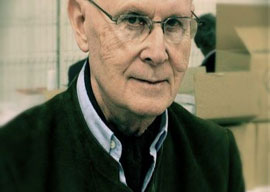
May 29, 2013

Dominique Venner
In a final nod to PC, Thurman tells us that Venner’s commentaries “evoked the racist, xenophobic, and anti-Semitic rhetoric of the Fascist European right between the two World Wars, which has been moderated, though not abolished, by postwar hate-speech laws.” Thurman does not offer even a sliver of proof that Venner imitated the style of Hitler’s Mein Kampf; having read both Venner and Hitler, I would have no trouble distinguishing between the two, even if I”m not a certified “antifascist.” But we should be grateful for small improvements: Now we have the enforcement of “hate-speech laws” in Europe to protect us from what Ms. Thurman doesn”t care to hear. As one of her respondents asks very much to the point: Is Ms. Thurman out to ban as reminiscent of fascism any oral or written communication that doesn”t meet her criteria of sensitive speech?
Thurman’s treatment of Venner as a trained historian specializing in military affairs is almost as perplexing as it is glaringly biased. Thurman tells us that Venner wrote a work “admiring of the Vichy collaboration with Hitler” and other presumably pro-Nazi polemics, but she then identifies the dead author with “a history of the Red Army that received a prize from the Académie Française.” Venner was widely respected for his objective two-volume Histoire de L”Armeé Rouge, which starts with the creation of the Soviet army during the Russian Civil War and then examines the further development of Soviet military forces through World War II. Venner also compiled an eleven-volume encyclopedia on firearms that continues to enjoy academic favor. The works that obviously irk Thurman, however, are Venner’s sympathetic studies of the white forces that combated the Red Armies and his work on French divisions that fought alongside the Wehrmacht in Russia during World War II.
Perhaps most inexcusably for his leftist critics, Venner published a critical work on the French Resistance in 2000, presenting its shadow side in a way that the French left or its American journalistic appendix do not care to hear about. Venner reminded us of the frequency with which communists in the Resistance carried out assassinations against political enemies, a tendency that became pandemic after the Liberation. He also dwells on isolated terrorist acts by the Résistants that did little to advance the cause of freeing France from a foreign occupation.
I knew Venner best for having edited two stimulating journals that I would devour whenever I could get my hands on them: Enquête sur l”histoire (in the 1990s) and its recent successor La Nouvelle Revue d”Histoire, a publication that displays the same willingness to defy leftist taboos as everything else Venner wrote.
A kindly leftist historian Benoît Rayski wrote after he heard of Venner’s death:
I rarely agreed with his ideas, but he was a man who escaped with his courage and nobility from the usual ideological trappings and he wore his independence as a badge of honor.
Too bad our leftist hacks in Midtown can”t show a similar generosity toward a dead, non-conformist scholar.